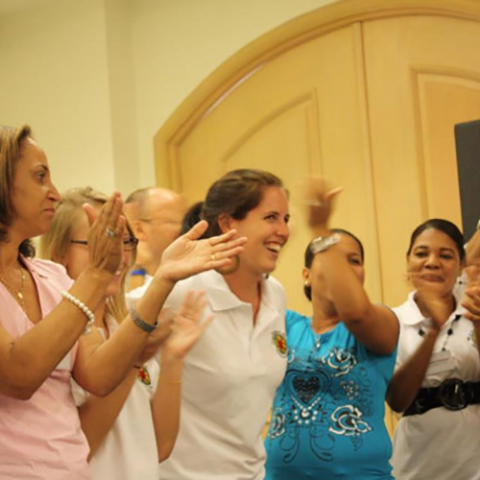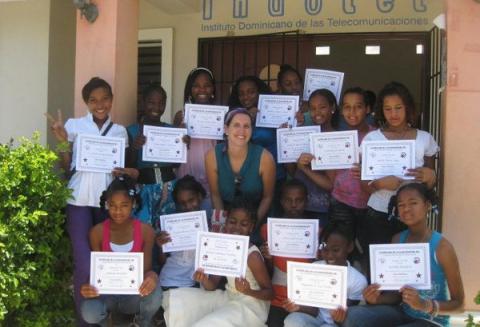Natalie Ferrell
B.A. Alumna

Biography
Youth Development Promotor for Peace Corps, Santo Domingo, Dominican Republic
(Natalie describes this picture: My coordinating committee and I at the close of the 2012 National At-Risk Youth Conference we organized, which brought together 30 local, national and international NGOs working with vulnerable children and youth in the Dominican Republic.)
After graduating from Tulane with a double major in Latin American Studies and International Development, Natalie simultaneously taught volunteered for Teach for America and pursued an MS in Bilingual eduaction at Pace University. While serving in Teach for America, Natalie taught ESL/bilingual Science at a middle school for new immigrants in New York. She then returned to New Orleans for an MPH in International Health and Development from Tulane, during which time she also worked as a Spanish Immersion Teacher and as an Intervention Specialist, mentoring and evaluating new teachers in the teach NOLA program, the New Orleans component of The New Teacher Project. Natalie is currently a Peace Corps volunteer in the Dominican Republic. She directs the Peace Corps-wide initiative “Escojo Enseñar,” a comprehensive teacher-training initiative comrpised of conferences, manual, and videos to be implemented with teachers cross the country. She also works on capacity building initiatives with a child’s rights NGO that works on behalf of exploited youth.
Natalie reflects on her experience at Tulane…
Why did you choose to major in Latin American Studies?
Being from Texas, I have always been fascinated by Tex-Mex traditions that were a part of my upbringing. When I was in high school, I did a program called Amigos de las Americas (sort of like a mini-Peace Corps) that sent me to live and work in a rural area of Oaxaca, Mexico for a summer. This experience impacted me greatly and piqued my interest in the region in general. I also knew that I wanted an interdisciplinary experience where I could take classes across different areas of study, and that Tulane had one of the most well respected and well funded LAST programs in the country. So, I knew I would be taking advantage of the best of what Tulane had to offer!
How has your background in LAST helped you since graduation?
All of my work experiences since graduation have involved either working with Latino populations in the States or working abroad in Latin America. The broad background I gained on the region through LAST was invaluable in each of these settings. My LAST classes also gave me a solid base in history and geopolitical structures that have allowed me to engage more thoughtfully with current events. I often take for granted this perspective, but recognize that, had I chosen to major in business, for example, I would likely not have the acute awareness of the world around me that my LAST education provided. All of my coursework in Latin American Studies and International Development were great preparation for being a Peace Corps volunteer. My job with Peace Corps gives me a chance to see how theory plays out in real world situations.
In hindsight, what would you have done differently as a LAST major?
I am very satisfied with the way my Latin American Studies major played out. Â I took a nice variety of courses, co-majored in International Development (which provided an interesting perspective), and took advantage of the excellent faculty and resources that the Latin American Studies program had to offer. I would have liked to take a Latin American history course, but at the time was scared off by the amount of reading!
Any words of wisdom for LAST undergraduates?
My perspective on my undergraduate years has changed with masters’ degrees and work experience under my belt. I truly believe that your undergraduate years are about finding something you are passionate about and learning to think critically. You will, in all likelihood (and especially in today’s economy) have to get a master’s degree regardless. You can worry about applying your generalist experience to more specific career paths then (or double major with a more specific discipline such as Spanish, International Development, history, etc). Focus on finding classes that really interest you across all disciplines (art, history, music, culture, etc), where you’ll be excited to do the work. This was my approach, and I had an unforgettable learning experience in Latin American Studies at Tulane.
(Of this picture, Natalie writes: My “Chicas Brillantes” and I at their graduation in Boca Chica, Dominican Republic – Chicas Brillantes is a Peace Corps girls empowerment program that aims to increase self-esteem in young girls and therefore reduce violence against women.)

